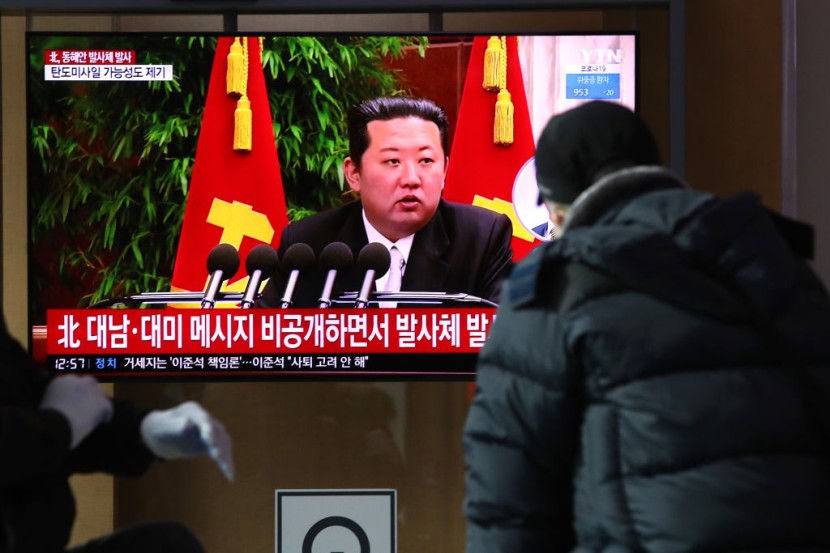
As he prepares to strike a nuclear weapon at any moment, Kim Jong Un has given a terrifying message to the West. It comes despite the United States threatening to "respond quickly" with allies if North Korea's ruler conducts a nuclear test.
North Korea has finalized preparations for a second nuclear test, according to South Korean Foreign Minister Park Jin, and the only way to stop it is for the ruler to make a political choice.
Kim Jong Un Is Feared To Conduct 8th Nuclear Test
Following conversations with Secretary of State Antony Blinken in Washington, the senior diplomat warned the North would pay a high price if it went through, amid worries Kim Jong Un might conduct his eighth nuclear test within days.
Last week, US and South Korean officials indicated simply that North Korea was approaching completion of such preparations and encouraged Kim Jong Un to "make the right decision." Park did not specify what measures the North would face or how the deterrence strategy would alter, The Sun reported.
However, according to Blinken, the US and treaty allies South Korea and Japan might modify their military positions as a result. "The pressure will be maintained, continued, and, when required, enhanced," he continued.
Kim Jong Un, who was spotted on Sunday smoking on a cigarette while holding a meeting after firing long-range artillery into the sea near South Korea, is ready to negotiations without preconditions, according to Park and Blinken. However, Blinken bemoaned that North Korea continues to rebuff offers for discussion, echoing statements made by a number of US officials in recent days.
Park and Blinken decided to reactivate an extended deterrence working group, a policy body that deals with the US nuclear umbrella that protects South Korea, as soon as possible. He stated the committee is in charge of deploying strategic assets as needed, but he didn't elaborate. Blinken stated that Washington was prepared to change its military posture in the short and long term as needed, as per Mirror.
Blinken predicted that the working group will resume operations in the coming weeks, and that Washington and Seoul were committed to discussing how to broaden the scope and extent of their joint military exercises. North Korea's first female foreign minister, crucial nuclear negotiator Choe Son Hui, was appointed last week, according to Blinken, but the US approach to a country is based on its policies, not individuals.
Last week, China's UN representative said that Beijing did not want to see another North Korean nuclear test, which is one of the reasons it rejected a US-led effort to put further UN sanctions on Pyongyang. Sanctions on Pyongyang for launching new ballistic missiles.
Ambassador Zhang Jun, on the other hand, cautioned against forming assumptions about Beijing's reaction to a seventh test, which Washington has warned may occur "at any time."
North Korea's Previous Nuclear Tests
China and Russia have been pressing for an easing of sanctions on North Korea in recent years, purportedly for humanitarian reasons and in the aim of persuading Pyongyang to resume talks. According to Daily Mail, North Korea has conducted seven nuclear tests in its history, all of which took place beneath Mount Mantap at the Punggye-Ri detonation site. The first occurred in 2006, while Kim Jong Un's grandfather, Kim Jong Il, was in power, and the most recent occurred in September 2017.
Punggye-Ri was considered to have been largely destroyed in the last detonation, which erupted with a force of up to 280 kilotons of TNT - about 20 times that of Hiroshima's atomic bomb.
Mount Mantap seemed to have partially fallen on satellite pictures, leading to concerns that tunnels beneath it had also caved in. Those fears were confirmed when Kim Jong Un volunteered to put the facility on hold as a goodwill gesture ahead of meetings with Trump.
The gates to the site, as well as another nuclear testing site, were then blown up with TNT explosives, according to North Korean official media. However, repairs have been happening there since at least March of this year, according to the US and South Korean governments.
Following recent leadership changes in both capitals, Washington and Seoul have become increasingly optimistic on North Korean nuclear tests. When the North recently tested eight smaller missiles, the allies retaliated by shooting eight of their own. Twenty American and South Korean fighter planes, including the latest-generation F-35 stealth jets, took part in drills over the Yellow Sea the next day, Seoul claimed, to demonstrate its "overwhelming reaction" to any threats.
Despite limited resources, North Korean leader Kim Jong Un has increased his weapons development since taking office in 2011. North Korea might claim the capacity to create small bombs that could be grouped on a multiwarhead ICBM or fitted on short-range missiles that could reach South Korea and Japan with its next test, experts warn.
© 2026 HNGN, All rights reserved. Do not reproduce without permission.








